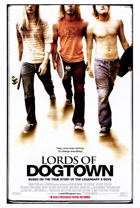Lords of Dogtown
|  Lords of Dogtown, a fictionalization of the same material in the 2001 documentary Dogtown and Z-Boys, is part celebration of 1970s Southern California punk culture, part rise-and-fall social drama, and part cautionary tale about the perils of youth and success. All of these components make for a somewhat uneasy mix, but the film is made with such exuberance and energy that it sweeps you into its heady narrative drive anyway. Lords of Dogtown, a fictionalization of the same material in the 2001 documentary Dogtown and Z-Boys, is part celebration of 1970s Southern California punk culture, part rise-and-fall social drama, and part cautionary tale about the perils of youth and success. All of these components make for a somewhat uneasy mix, but the film is made with such exuberance and energy that it sweeps you into its heady narrative drive anyway.For those not in the know, "Dogtown" was the nickname for Venice Beach, California, also referred to as the "ghetto by the sea." Basically a dilapidated Coney Island-style boardwalk and amusement park, its skeletal remains were taken over by young-punk surfers who guarded it like precious territory. Out of this subculture emerged Team Zephyr, a group of teenage skateboarders who reinvented the sport with wicked new moves and, more importantly, a rock star attitude previously unknown in the sport (which, as depicted here, was rigidly boring before the Z-Boys took over). The central trio of Team Zephyr was Jay Adams (Emile Hirsch), the most gifted of the bunch, but also the one most constantly in danger of falling prey to his own inner demons; Stacy Peralta (John Robinson), an open-faced, utterly guileless kid with the biggest heart and a sense of responsibility, to boot; and Tony Alva (Victor Rasuk), the most aggressive and ambitious. They skate under the thumb of Skip Engblom (Heath Ledger), co-owner of the Zephyr Surf Shop and anointed father-figure of all the teen punks in the neighborhood. Skip's sun shines brightly at first, as everyone in the neighborhood wants to be associated with him in some way, but once everyone else's suns are on the rise and the endorsement deals start pouring in, Skip starts looking dimmer and dimmer. The performances are all strong, particularly Hirsch's turn as a trouble kid whose unique gift isn't enough to keep him from sinking into his own personal abyss. Heath Ledger's turn as Skip is showy, but effective, in that his self-conscious scenery-chewing is evocative of Skip's own need to constantly put on a show to remind those around him of who's in charge, even when he it's just a facade. Director Catherine Hardwicke and cinematographer Elliot Davis, who worked together on Hardwicke's directorial debut, the contrived shocker Thirteen (2003), give Lords of Dogtown a gritty, grainy '70s look and feel, which is naturally punctuated with every overplayed rock anthem of the decade. The film is at its best when the skaters are improvising and inventing, using empty swimming pools in rich neighborhoods as their own personal sky-blue skate bowls. Davis gets his camera down low, moving at breakneck speed right behind the skaters as they rip and roar up and down the curved walls of the pools, defying gravity at every turn with simple momentum and balance. The invention of polyurethane wheels, which gave skateboards better grip and traction, is the technological breakthrough that leads to the sport's reinvention, but the film leaves you with the clear feeling that it was the kids' rambunctious spirit and anarchic desire to defy conventions that was the real impetus. The wheels just allowed it to happen. There's plenty of drama along the way, of course, especially once the kids get famous on the covers of magazines, and endorsement deals, lucrative marketing gigs, and hypersexed groupies quickly follow. Tony Alva goes after the gold without looking back, while Stacy Peralta hesitates, feeling that he owes something to Skip. Meanwhile, Jay Adams begins to retreat into himself, finding solace in gang life and an outright rejection of the kind of lavish rock-star lifestyle Alva so fervently embraces. You can trace Jay's downward spiral by how much he begins to look like one of Malcolm McDowell's droogs from A Clockwork Orange (1971). If Lords of Dogtown has a real weakness, it is in the script's insistence on pulling together a rosy ending, despite the bitterness, failures, and broken relationships left in the wake of stunning and sudden success. The script was written by Stacy Peralta, who obviously lived the life and even filmed it before in Dogtown and Z-Boys, and most of it is of a piece. The ending, though, which mixes in sentimental reunion, medical tragedy, and the inescapable captions informing us of where all the major characters ended up in life, feels like it was tacked on at the last minute in an attempt to ensure a life-affirming conclusion to the film's cautionary elements. Still, even the rote Hollywood vibe of this particular ending isn't enough to erase all gutsy, cement-loving energy of the preceding two hours. Copyright ©2005 James Kendrick Thoughts? E-mail James Kendrick All images copyright ©2005 Columbia Pictures |
Overall Rating: 

 (3)
(3)


